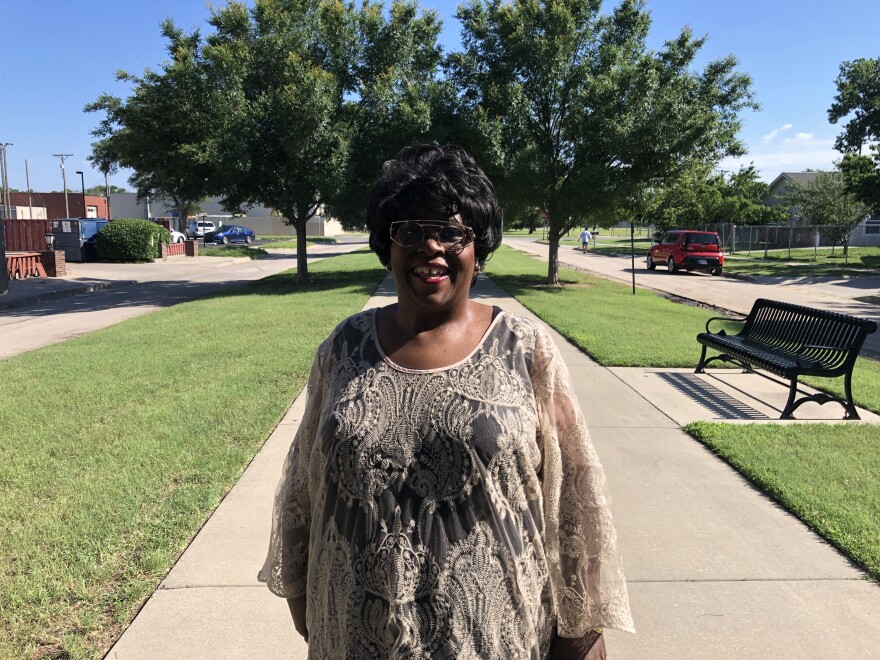Hattie McDaniel is best known as the first African-American to receive an Academy Award. The actress and radio performer has two stars on the Hollywood Walk of Fame, and her image is on a U.S. postage stamp.
Still, most people aren’t aware that McDaniel was born here, in Wichita.

Her birthplace and childhood home, at 925 N. Wichita, is a familiar spot to Karla Burns. The longtime actress and singer recently reprised the role of the legendary Hattie McDaniel in “Hi Hat Hattie," by Larry Parr.
On a recent trip there, Burns approaches the site with reverence and respect.
There is an 11-foot-wide bike path down the center of the road, with a black iron rod bench installed right along the edge of the path. Apartments line one side of the street and houses on the other.
But Burns notices something is missing: a trail marker placed there by The Kansas African American Museum in 2011, part of a walking trail of significant sites throughout Wichita. The City of Wichita removed the marker after the sign sponsor went out of business.

"I'm saddened by that because I recall there being a marker and I want there to be a marker,” Burns says. “Because she’s the most famous, because they still talk about her, Hattie McDaniel at the Oscars. She was the first African-American to be nominated and to win an Academy Award back in the day [for her role as Mammy in “Gone With The Wind”].
"She was brilliant, brilliant!"
Some people, including the NAACP, took issue with stereotypical roles that were shown on screen. There was concern about McDaniel playing a maid.
“You know, I've heard that all my life”, Burns says. “As I've gone around and I've lectured and I've talked to many audiences about who she was and what she did, she became the most famous maid of all, I know no other.
“Hattie McDaniel was once asked by a reporter, 'Are you comfortable doing this? Why would you want to do this?' And she said, 'Well, you know, I would rather play a maid for 700 dollars a week then be a maid for seven dollars a week.'
“She really paved the way, I mean she was a singer, actor, dancer,” Burns says. "She was everything I knew that I wanted to be heading into my education, she was the one that I thought about. She was the one that I wanted to fashion my life after."
Burns notes other significant achievements by the legendary Wichita native: McDaniel was the first African-American woman to star in her own radio show, "The Beulah Show," replacing a white male actor.
“She was also the first African American woman on the radio to sing,” Burns says.
McDaniel starred in the television version of “The Beulah Show," taking over for Ethel Waters after the first season. It is the first sitcom to star an African-American actress.
“She paved the way for other African American actresses," Burns says. “It was fascinating to me."
McDaniel later became an activist in California. In 1945, she helped to mobilize neighbors in her West Adams neighborhood in Los Angeles to fight against racial segregation in housing — and won.
McDaniel died of breast cancer in Los Angeles in 1952. She was 57 years old. Her gravesite is at Angelus-Rosedale Cemetery, formerly Rosedale Cemetery, in Los Angeles. McDaniel’s birth is listed in some places as 1895, though some documents list her birth as 1893.
In her will, McDaniel’s wish was to be buried in Hollywood Memorial Park (now Hollywood Forever Cemetery).
“I desire a white casket and white shroud; white gardenias in my hair and in my hands, together with a white gardenia blanket and a pillow of red roses," McDaniel requested. "I also wish to be buried in the Hollywood Cemetery which is located on Santa Monica Boulevard in the City of Los Angeles.”
McDaniel’s request was denied because of segregation, a whites-only policy. Decades later, Hollywood Forever Cemetery offered to have McDaniel reinterred there to honor her wishes.
“They tried to move her," Burns says, "and then her family said never mind."

In 1999, a memorial cenotaph for the legendary actress was placed in Hollywood Forever Cemetery by McDaniel’s relatives and the owner of the cemetery.
Here in Wichita, The Kansas African American Museum hopes to replace the missing marker and recognize McDaniel once again. The site is expected to be included in a new walking trail.
"I talk about Hattie McDaniel in every single lecture that I do, everywhere that I go," Burns says, "because she’s an important Wichitan, she’s an important Kansan, she’s an important icon."



